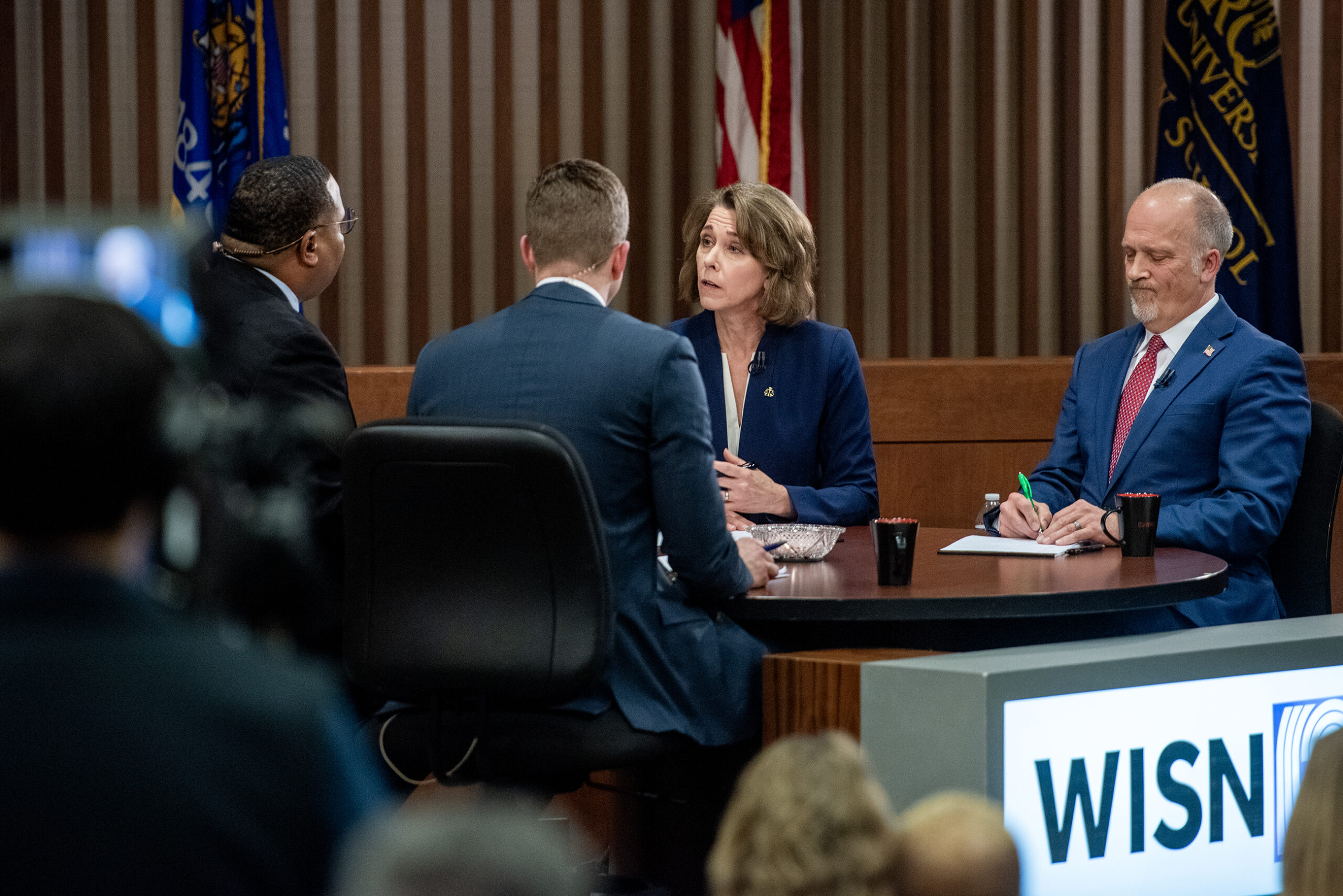The four candidates running for a pivotal seat on the Wisconsin Supreme Court laid out how they’d approach the job during a forum in Madison Monday, with some of the candidates sending strong signals about their views on issues like redistricting and abortion.
Waukesha County Judge Jennifer Dorow, former Wisconsin Supreme Court Justice Dan Kelly, Dane County Circuit Court Judge Everett Mitchell and Milwaukee County Circuit Court Judge Janet Protasiewicz are all seeking a 10-year term on the court to replace conservative Justice Patience Roggensack, who is retiring. Roggensack endorsed Dorow Monday.
The court currently has a 4-3 conservative majority, meaning the race could flip the ideological balance of the court. While the race is officially nonpartisan, Dorow and Kelly are supported by Republicans while Mitchell and Protasiewicz are backed by Democrats.
News with a little more humanity
WPR’s “Wisconsin Today” newsletter keeps you connected to the state you love without feeling overwhelmed. No paywall. No agenda. No corporate filter.
The forum comes a little more than a month before voters head to the polls in a Feb. 21 primary. The top two vote-getters will advance to the general election on April 4.
Here are some of the issues they addressed.
Abortion
While the candidates were not asked directly about abortion, the issue came up when they were asked to name the worst Supreme Court ruling they’d seen in the last 30 years.
Mitchell and Protasiewicz both listed U.S. Supreme Court’s Dobbs v. Jackson Women’s Health Organization decision, which overturned Roe v. Wade and reversed decades of precedent guaranteeing abortion rights.
“It was the first time in my study of the law that I can see that the Supreme Court went and took a right,” Mitchell said.
Mitchell said the decision had left behind chaos where each state is making its own decisions about reproductive choice.
“We’re dealing with the consequences of the instability all throughout our country, and all throughout many people’s lives right now,” Mitchell said.
Protasiewicz said she was surprised the U.S. Supreme Court overturned Roe.
“That is the epitome and definition of judicial activism,” Protasiewicz said. “Three generations of women have counted on Roe v. Wade, to allow them to make their own decisions in regard to reproductive rights.”
Protasiewicz said she couldn’t say where she would end up on the issue on a case involving abortion, but she said that she could share her personal values when it comes to the issue.
“My value is that women should be able to make their reproductive right decisions themselves,” Protasiewicz said.
Neither Kelly nor Dorow mentioned Roe in their answers. Both were once appointed to judicial positions by former Republican Gov. Scott Walker, where they were asked a similar question on their applications.
At the time, Kelly, whom Walker appointed to the Wisconsin Supreme Court, cited a 2005 ruling that expanded the government’s power of eminent domain, according to the forum moderator.
“This is significant interference with the liberties that our Constitution protects,” Kelly said. “And so I think that opinion stands up well as one of the worst opinions.”
In her application to the Waukesha County Circuit Court, the forum moderator said, Dorow cited the 2003 U.S. Supreme Court decision overturning a Texas anti-sodomy law. She did not address that case or provide another example in her answer to the question Monday, instead saying she would follow the law regardless of whether she liked it.
“Sometimes, the words, or even the statutes themselves, are stupid,” Dorow said. “But stupid doesn’t mean unconstitutional. It doesn’t matter to my job whether I liked the words or even agree with the law. My job is to apply the words and what they mean.”
Redistricting
The candidates were also asked about the Wisconsin Supreme Court’s decisions in the state’s last round of redistricting, where conservative justices decided to approve a map that took a “least changes” approach to redistricting. In practice, that meant approving a map that adhered closely to the one Republicans passed and Walker signed in 2011.
Following a string of court decisions that included an appeal to the U.S. Supreme Court, Wisconsin’s conservative majority eventually approved the legislative redistricting plan passed by Republican lawmakers in 2021, which had an even stronger GOP advantage than the map the Legislature passed a decade earlier. In last year’s elections, Republicans grew their majorities in the Legislature, even as Democratic Gov. Tony Evers won his race statewide.
Protasiewicz and Mitchell both attacked the decision.
“Let’s be clear here: the maps are rigged,” Protasiewicz said. “I don’t think you could sell to any reasonable person that the maps are fair.”
Protasiewicz said the idea of a “least changes” map might sound good to people, but in practice it had taken meaningful representation away from voters.
“I see no basis for it in the Constitution, no basis in caselaw,” Protasiewicz said.
Mitchell said that democracy had become “broken” in many ways and called for legislators to draw districts in a fair, nonpartisan way. Mitchell, who is Black, also criticized the use of “least changes” as a rationale for map-drawing.
“Anytime as an African American in judicial spaces (you) hear the words “least change approach,” it just brings up all kinds of past trauma of how people didn’t want to change stuff because it did not empower our communities,” Mitchell said. “It always means more oppression and more pain for folks who don’t have a voice in the political process.”
Kelly, who was not on the court when justices issued their redistricting decisions, largely defended the court’s approach to redistricting.
“The phrase ‘least change’ is meant to capture what the court’s responsibility is when it has to consider a redistricting map,” Kelly said. “When a map comes to the court … the court’s responsibility is limited to considering the legal challenges, not the political challenges.”
Kelly also criticized Protasiewicz for weighing in on redistricting.
“I think when someone tells you what their values are in answer to a legal question, they’re telling you how they’re going to decide a case,” Kelly said.
Dorow described the recent redistricting process as “interesting” but declined to weigh in on the maps, or discuss the court’s rationale, noting that there was talk of bringing additional redistricting lawsuits in state court.
“So I will not put myself in a position to prejudge anything,” Dorow said. “But as with any case, I will listen to the challenge, and I will apply the law to the facts at hand.”
Recusal
With so much focus on Wisconsin’s Supreme Court, the state’s political parties and outside interest groups are expected to spend millions of dollars trying to influence the contest. Many of those groups could some day have business before the court.
Right now, it’s up to justices to decide when to recuse themselves from those cases, although there has been an effort to get the court to adopt consistent recusal standards.
Dorow voiced support for the current standard, which leaves it up to justices to decide when they can hear cases.
“My integrity cannot be bought by anyone,” Dorow said. “Justice requires that judges and justices hear the cases that come before the court. We have an ethical obligation to diligently take care of our cases.”
Kelly also voiced support for the current system.
“Only we can truly know whether we are going to be adversely impacted by someone’s contribution,” Kelly said. “It would be extraordinarily difficult to develop a standard of recusal.”
Mitchell also did not endorse new recusal standards, saying it was up to justices to be frank with people who come into their courtroom.
“If you cannot listen to evidence in a fair manner, then you need to make sure that you give the person in front of you the due respect to tell them I need to get off this particular case,” Mitchell said.
Protasiewicz endorsed the idea of new recusal standards but didn’t say where the line should be drawn that would require justices to step aside in cases involving their supporters or critics.
“There has to be a recusal rule,” Protasiewicz said. “The public has to weigh in. I’m not going to sit here and tell you what I think an exact number is.”
Monday’s forum was organized by Wispolitics and moderated by WisPolitics Editor JR Ross and CBS58 Capitol reporter Emilee Fannon.
Wisconsin Public Radio, © Copyright 2025, Board of Regents of the University of Wisconsin System and Wisconsin Educational Communications Board.





